Seeing Rainbows
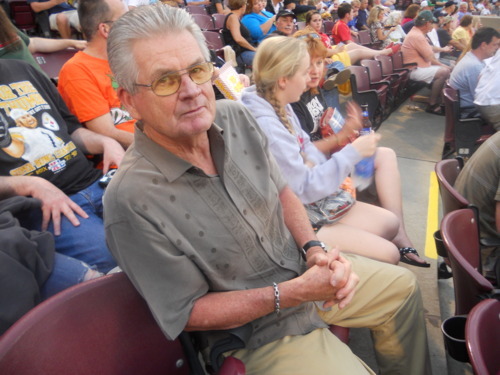
This is an edited version of an essay I wrote for my upcoming column for the Kane County Cougars of the Midwest League.
June 21, 2011
DAYTON, Ohio—-Baseball Hall of Fame writer Hal McCoy has covered 7,000
Cincinnati Reds games in his 39 year career with the Dayton Daily News.
He knows every game is as different as a cloud in the summer sky.
In late May I took McCoy to a Dayton Dragons game at Fifth Third Field in Dayton. McCoy, 70, said he is semi-retired but he still does a popular “Real McCoy” blog for the Daily News and appears on the Fox Sports affiliate in Cincinnati.
He is legally blind.
He said it was the first time he had sat in the stands for a game in 30 years.
We were discussing all aspects of baseball until the third inning when a torrential storm rolled through downtown Dayton. The power at Fifth Third Field went out. We were instructed to seek shelter in the bathrooms. I have been to maybe 2,000 baseball games, but nothing like this happened to me. Or him.
I quickly saw what a beloved figure McCoy is in Dayton.
People said hello and shook his hand in the crowded concourse. Some fans offered him a ride.
I dodged through the thick raindrops to fetch my car and drove McCoy home.
The game stopped at 7:37 p.m. It resumed at 10:07 p.m., when I was somewhere
north of Indianapolis. I thought about McCoy during most of my drive back to
Chicago.
I considered his humble nature, his dignity and his loyalty to his native Ohio. I saw a rainbow over Dayton as I left town.
I know he still sees rainbows despite going legally blind after a sudden August, 2003 stroke to the optic nerve in his right eye. In January, 2004 the same thing happened in his right eye.
“Everything is dark and fuzzy,” he told me as the Dragons game began. “Things up close are real fuzzy. I do better with the distance. I can see the scoreboard. When the pitcher throws the ball I can see it. When the batter hits a live drive or on the ground I can see it. When someone hits up in the air, I’m lost. I haven’t seen a home run since 2003.
“But what I’ve learned—-and it took me 35 years to learn this—I noticed by watching the hitter that when he hits the ball his head immediately follows the ball. If he hits it to left field, he’s looking left, if he hits it to right, he’s looking right. Most people follow the ball when the batter connects. I keep watching the batter to see which way the ball goes. Then I watch how the outfielders react.”
McCoy watches games from the press box at the Great American Ball Park in Cincinnati. He types on a magnified screen laptop. A large flat screen television is above his seat. It is on seven second delay. If McCoy misses a play, he looks at the television set. “The Reds did that for me, which is very cool,” he said. The Daily News hired a retired school teacher to drive McCoy back and forth between his home and the ballpark.
McCoy has been up and down and all around this big country. He’s still
impressed by the small gestures.
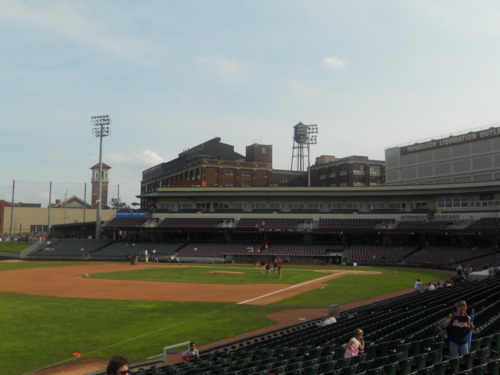
Dayton; before the storm.
Hal McCoy was born in Akron, Ohio and grew up a Cleveland Indians fan. His father
worked on the assembly line at B.F. Goodrich, his mother raised the four McCoy children while jobbing in a laundry on the side.
“I am the only person in three generations of my family that went to college,” he said. “We came from a very poor family. Blue collar. No books around the house. I didn’t start reading until I was in college.”
McCoy is 6’2”, still lean and lanky. He played on the basketball team at Akron East High School. During his junior year he took a typing class with a teacher who was the newspaper advisor. “She asked if I was on the basketball team,” McCoy recalled. “I told her I was. She didn’t have anybody on the paper to write about the basketball team.”
McCoy had never written anything in his life. He filed a story and the teacher was impressed. She suggested he take some journalism courses. “That was it,” he said. “Had it not been for Mrs. Rose Picciotti when I was at Akron East, I don’t know what I would be doing. But it wouldn’t be this.”
He remembers the small gestures.
McCoy attended Kent State University on a partial baseball scholarship and studied journalism. He began his career in Dayton in 1962, straight out of Kent State. “Its not like it is now,” he said. “When I graduated I had 11 job offers, including the Wall Street Journal. I wanted to write sports. They didn’t have a sports section. From 1962 to 1973 I covered everything for the Dayton Daily News. The Cincinnati Royals of the NBA, the Open and the Masters, the Indianapolis 500, the Cleveland Browns. I didn’t do any baseball until 1973 when our baseball writer (Jim Ferguson) left to become PR director for the Reds.”
McCoy had done some back-up baseball writing. He recalled, “The first manager I covered was Dave Bristol (Red manager 1966-69), a surly son of a gun. I was scared to death. The day of my first game Jim Ferguson told me Gary Nolan had a sore shoulder and he would be throwing in the bullpen before the game, so be sure to ask Bristol how he did. The Reds won 2-1. So after the game I go in there, bright, young enthusiastic reporter and I’m going to ask the first question. I said, ‘How did Gary Nolan do before the game? He goes, ‘JEEZZUS CHRIST, we just won a 2-1 game and you want to know how the hell Gary Nolan did?’ I didn’t ask another question for two weeks.”
Besides Bristol, managers ranging from Sparky Anderson to Pete Rose to Lou Piniella have rolled through Cincinnati during McCoy’s time.
‘In my 39 years of covering baseball, Dusty Baker is the best,” McCoy said in straight ahead tones. “As far as dealing with us. Dusty has never told me a lie. He’s answered every question I’ve asked him. He’s great with the media.”
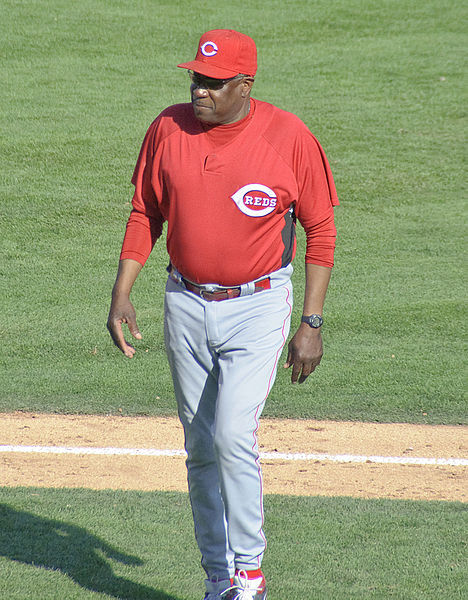
Hal McCoy is as synonymous to Dayton as the Wright Brothers.
After the season ends he hosts a Hal McCoy baseball clinic for a couple hundred inner city children at Fifth Third Field. He has lived in Dayton every year since 1962 except for 1967 when he spent a year writing for the Detroit Free Press.
“I didn¹t like Detroit,” he said. “That was the year of the race riots and the burned the city down. The sports editor of the Dayton Daily News called and asked if I wanted to come back. I said, ‘I’ll be there tomorrow.’.”
McCoy knows his way around Dayton as well as he knows his way around baseball America. “My favorite restaurant in Dayton is a steakhouse called the Oakwood Club [2414 Far Hills Ave.; (836) 293-6973.] I’ve eaten all over the country and that’s as good as any of them.
One of my top three restaurants is in Chicago, one you’ve probably never heard of. The Saloon. Its a steakhouse in a residential hotel (200 E. Chestnut) behind the John Hancock building. The first time I walked in there (actor) George Clooney was sitting at the bar with (late Reds announcer-pitcher) Joe Nuxhall. The meal I had there was unbelievable. I told (former Chicago Sun-Times baseball writer) Joe Goddard about it. He had never been there. I told (Chicago Tribune baseball writers) Dave Van Dyck and Paul Sullivan. None of them had heard of it.”
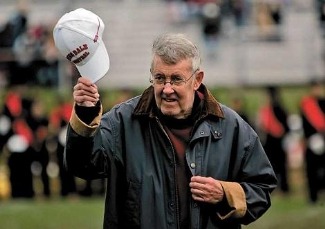
My friend Joe Goddard, also a great music fan.
McCoy was on a roll: “There’s a very good Italian restaurant called Mamma DiSalvo’s (in Kettering, a suburb of Dayton). I can’t go in there. The owner is a huge Reds fan. He wants to pick up my meal, give me a bottle of wine, sauce to take home. I said, ‘Bobby, I can’t do this. I have to pay.”
McCoy’s journalism hero was the late Jim Murray, a Pulitzer Prize winning sports columnist for the Los Angeles Times between 1961 and 1998. Like McCoy, Murray wrote with a gentle cadence and sly sense of humor.
“Its funny his career ended with eyesight probems too,” McCoy said as Dayton manager Delino DeShields ran to the third base coaching box. Yes, that former Montreal Expo and washed out Chicago Cub. McCoy continued, “Jim’s problems were much more severe than mine. I’d read him and say, ‘I know all those words. I just can’t put them together that way.
“One of my favorites in Chicago was Bob Verdi. He was a very good writer and a verygood friend. I’m a newspaper nut and I hate to see the way the business is going now. The Dayton newspaper is disappearing. When I traveled I read every newspaper I could get a hold of. I loved going to Philadelphia, because I loved the Philadelphia Bulletin, the old PM newspaper. Because they were writer’s newspapers. Just like the Boston Globe. Or the Los Angeles Times (before Tribune Company microwaved it).”
Chicago was Bob Verdi. He was a very good writer and a very good friend.
McCoy resisted blogging over and over until the Daily News made him do it.
“Now I love it,” he said.
What does he love about it?
“No editors,”he answered. “No space limit. Nobody screwing with your copy.”
Just like this blog.
McCoy is working on his memoirs. He subscribes to the belief that baseball lends itself to poetic writing. “No doubt about it,” he said. “People ask me all the time how I come up with something different every day. Its because every game I have ever covered is different. I see something every week I’ve never seen before in a baseball game. It amazes you. Its like what Bart Giamatti wrote, ‘Its a game designed to break your heart.”
Around Southern Ohio McCoy is best known for his full-circle relationship with Reds icon Pete Rose. In 1978 he co-authored “The Official Pete Rose Scrapbook (The Life, Times and Streak of Charlie Hustle)” with Rose. “The amazing story about that book is the publisher gave me 500 pictures of Pete,” McCoy said. “I got together with Pete in Philadelphia one morning to get information for my cutlines, I had this stack of pictures for him to go through. He picked up every picture and told me what it was: ‘That’s the day I went three for five against Phil Niekro.’ We’d turn the photo over and he’d be right. We did the entire book that way. Amazing memory for baseball.”
Things changed.

Pete Rose (left) and Fred Lynn
“Its a long, long story,” McCoy said. “When Pete played he and I were great friends. You’d ask him a question and he would fill your notebook. In 1989 when all this broke my sports editor called me in. He said, ‘I know how close you are to Pete and can you cover this?’ I considered it an insult. I consider myself a professional. I said, ‘Yeah, I’ll do the job, wherever it takes me.”
McCoy spent all of the 1989 season grilling the feisty Rose with tough gambling related questions.
“I had to cover the games and also address that,” he said. “1989 was the bane of my career, plus here was a guy I loved and admired going down the tubes. We had four or five people covering the story but I was the guy who had to take it to him every day. He got to hate my guts.”
After Rose was suspended, McCoy and Rose did not speak for 15 years.
Furthermore, Rose would rip McCoy in comments to the press. Rose confessed to betting on baseball in his 2004 autobiography “My Prison Without Bars.” McCoy did not co-write that book.
McCoy said, “A year after that my wife and I were in Las Vegas during the all-star break and Pete was in a memorabalia shop signing autographs. My wife tells me to go say hello.” McCoy first thought that was a very bad idea but decided to follow through.
“Pete had his head down signing,” McCoy recalled. I said, ‘What do you say old timer?’ He looked up and his face turned red, purple and blue. But he jumped up, shook hands with me and invited me behind the table. We had our picture taken together and he signed it, ‘To a great Hall of Famer from the Hit King, Pete Rose.‘ We’ve been close ever since. I have his number in my cell phone.
“Pete’s not allowed in the press box, but soon after that he was outside the press box in Cincinnati and asked for me. I went out and Marty Brennaman, the Hall of Fame broadcaster came by. So the three of us are standing there talking and a fan came by with a camera.
The fan asked if he could take a picture of the three Red amigos. They agreed.
“The guy says, ‘Look at this, three Hall of Famers!,’ McCoy recalled with a smile. And Pete says, ‘Well, two and a half.”
McCoy has hall vote (he has voted for Ron Santo) and believes Rose should be in the Hall of Fame, but he shouldn’t be involved with major league baseball. “That’s the Catch-22,” he said. “To be eligible for the hall, he has to be reinstated. Bud (Selig, commissioner) hates him. It isn’t going to happen.
“Its an American sports tragedy.”
Characters in the game have changed over the years but McCoy doesn’t think the game itself has changed that much. “The major change is when they brought in the designated hitter, which I hate,” he said. “I’m a purist and a dinosaur.”
I told McCoy I think the game is slower than it was during the late 1960s and 1970s when I grew up watching a golden age of baseball.
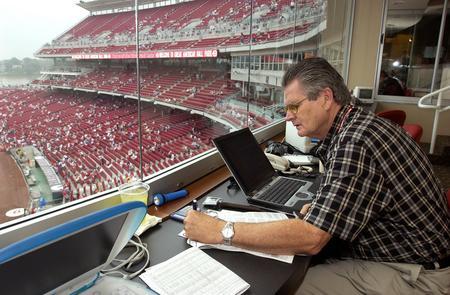
“I tell people, if you love baseball, why do you care?,” he answered. “I know I complained about it when it got close to deadline, but that’s being selfish. Although its true, the batters get out of the box after every pitch. Readjust their batting gloves. Readjust their helmet. Knock the dirt out of their cleats. Step back in. Throw the pitch. Then do the routine all over again. (Former Reds first baseman) Sean Casey used to drive me crazy with his routine.”
Sean “The Mayor” Casey, Ertic Davis and Ken Griffey, Jr. are among the favorite players McCoy has covered. “In 39 years of covering baseball, I’ve only had one player call me at home,” he said. “On the morning of my wedding to my current wife, my second wife, the phone rings. I pick it up. I hear, ‘Hal, it’s Sean Casey, I just want to congratulate you and wish you good luck on your marriage.’ Number one, I didn’t know he had my phone number. And number two, I didn’t know he knew I was getting married.
“But my all-time favorite is Aaron Boone.”
McCoy had gone blind. He was using a flashlight to help see things he dropped on the floor. He was depressed. He hadn¹t missed a Reds road trip in 35 years. “I only went to spring training that year because the sports editor made me,” he said. “I looked around the clubhouse in Sarasota and it was dark and blurry. I couldn’t recognize the faces of guys I covered for years. Aaron asked me what was wrong. I said, ‘You’re seeing me for the last time. I’m going home.’ He said, ‘What do you mean?’ I told him what happened.” Boone grabbed McCoy’s thick elbow and took him to the stool by his locker stall.
He told the old sportswriter to sit down.
“Then he said, ‘Don’t ever let me hear you say the word ‘quit’ again,” McCoy recalled with a twinkle in the eyes behind the glasses. “He said, ‘You love your job, you’re good at your job. We’ll help you any way we can. And I was going home. I’d written critical stories of Aaron Boone, but for a ballplayer to do that for a writer is something.”
I told McCoy I sensed rebirth in his spirit.
“No doubt about it,” he answered. “I would have been done. I’ll admit there were nights I laid in my condo in Florida during spring training and cried all night. Then I’d turn on my laptop and read e-mails from people encouraging me and telling me how much I meant to them since I’ve been around so long.
“Now there’s a whole lot more.”
A rainbow loomed in the distance.
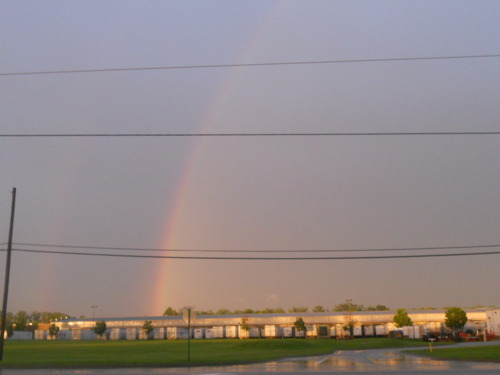


Leave a Response